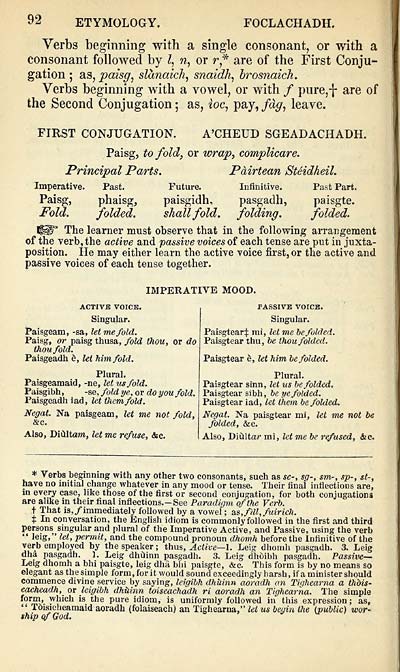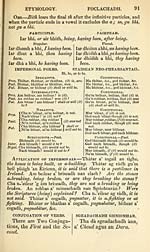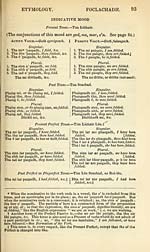Books and other items printed in Gaelic from 1841 to 1870 > Stéidhean a' Ghràmair Ghaëlig
(120) Page 92
Download files
Complete book:
Individual page:
Thumbnail gallery: Grid view | List view

92
ETYMOLOGY.
FOCLACHADH.
Verbs beginning with a single consonant, or with a
consonant followed by Z, w, or r * are of the First Conju-
gation ; as, paisg, slànaich, snaidh, brosnaich.
Verbs beginning with a vowel, or with / pure,-j- are of
the Second Conjugation ; as, ìoc, pay, fàg, leave.
FIRST CONJUGATION. A'CHEUD SGEADACHADH.
Paisg, to fold, or wrap, complicare.
Principal Parts. Pàirtean Stèidheil.
Imperative. Past. Future. Infinitive. Past Part.
Paisg, phaisg, paisgidh, pasgadh, paisgte.
Fold. folded. shallfold. folding. folded.
I§ir The learner must observe that in the following arrangement
of the verb, the active and passive voices of each tense are put in juxta-
position. He may either learn the active voice fìrst, or the active and
passive voices of each tense together.
IMPERATIVB MOOD.
ACTIVE VOICE.
Singular.
-sa, let me fold.
Paisg, or paisg thusa, fold thou, or do
thoufold.
Paisgeadh è, lel Mmfold.
Plural.
Paisgeamaid, -ne, let usfold.
Paisgibh, -se, fold ye, or do youfold.
Paisgeadh iad, let themfold.
Negat. Na paisgeam, let me not fold,
&c.
Also, Diùltam, let me refuse, &c.
FASSIVE VOICE.
Singular.
Paisgtear^ mi, let me befolded.
Paisgtear thu, be thoufolded.
Paisgtear è, let him befolded.
Plural.
Paisgtear sìnn, let us befolded.
Paisgtear sìbh, be yefolded.
Paisgtear ìad, let them befolded.
Negat. Na paisgtear mi, let me not be
folded, &c.
Also, Diùltar mì, let me be refused, &c.
* Verbs beginning with any other two consonants, such as sc-, sg-, sm-, sp-, st-,
have no initial change whatever in any mood or tense. Their finai inflections are,
in every case, like those of the first or second conjugation, for both conjugations
are alike in their final inflections.-See Paradigm ofthe Verb.
t That is,/immediately followed by a vowel ; as,fìll,fuirich.
$ In conversation, the English idiom is commonlyfollowed in the first and third
persons smgular and plural of the Imperative Active, and Passive, using the verb
" leig, ' let, permit, and the compound pronoun dhomh beforethe Infinitive of the
verb employed by thespeaker; thus, Active— 1. Leig dhomh pasgadh. 3. Leig
dha pasgadh. 1. Leig dhùinn pasgadh. 3. Leig dhòibh pasgadh. Passive—
Leig dhomh a bhi paisgte, leig dhà bhi paisgte, &c. This form is by no means so
elegant as thesimple form, for it would sound exceedingly harsh, if a ministershould
commence divine service by saying, leigibh dhùinn aoradh an Tiahearna a thòis-
eacheadh, or leigibh dhìlinn toiseachadh ri aoradh an Tighearna. The simple
form, which is the pure idiom, is uniformly followed in this expression ; as,
" Tòisicheamaid aoradh (folaiseach) an Tighearna," let us begin the (vublic) wor-
shipofGod.
ETYMOLOGY.
FOCLACHADH.
Verbs beginning with a single consonant, or with a
consonant followed by Z, w, or r * are of the First Conju-
gation ; as, paisg, slànaich, snaidh, brosnaich.
Verbs beginning with a vowel, or with / pure,-j- are of
the Second Conjugation ; as, ìoc, pay, fàg, leave.
FIRST CONJUGATION. A'CHEUD SGEADACHADH.
Paisg, to fold, or wrap, complicare.
Principal Parts. Pàirtean Stèidheil.
Imperative. Past. Future. Infinitive. Past Part.
Paisg, phaisg, paisgidh, pasgadh, paisgte.
Fold. folded. shallfold. folding. folded.
I§ir The learner must observe that in the following arrangement
of the verb, the active and passive voices of each tense are put in juxta-
position. He may either learn the active voice fìrst, or the active and
passive voices of each tense together.
IMPERATIVB MOOD.
ACTIVE VOICE.
Singular.
-sa, let me fold.
Paisg, or paisg thusa, fold thou, or do
thoufold.
Paisgeadh è, lel Mmfold.
Plural.
Paisgeamaid, -ne, let usfold.
Paisgibh, -se, fold ye, or do youfold.
Paisgeadh iad, let themfold.
Negat. Na paisgeam, let me not fold,
&c.
Also, Diùltam, let me refuse, &c.
FASSIVE VOICE.
Singular.
Paisgtear^ mi, let me befolded.
Paisgtear thu, be thoufolded.
Paisgtear è, let him befolded.
Plural.
Paisgtear sìnn, let us befolded.
Paisgtear sìbh, be yefolded.
Paisgtear ìad, let them befolded.
Negat. Na paisgtear mi, let me not be
folded, &c.
Also, Diùltar mì, let me be refused, &c.
* Verbs beginning with any other two consonants, such as sc-, sg-, sm-, sp-, st-,
have no initial change whatever in any mood or tense. Their finai inflections are,
in every case, like those of the first or second conjugation, for both conjugations
are alike in their final inflections.-See Paradigm ofthe Verb.
t That is,/immediately followed by a vowel ; as,fìll,fuirich.
$ In conversation, the English idiom is commonlyfollowed in the first and third
persons smgular and plural of the Imperative Active, and Passive, using the verb
" leig, ' let, permit, and the compound pronoun dhomh beforethe Infinitive of the
verb employed by thespeaker; thus, Active— 1. Leig dhomh pasgadh. 3. Leig
dha pasgadh. 1. Leig dhùinn pasgadh. 3. Leig dhòibh pasgadh. Passive—
Leig dhomh a bhi paisgte, leig dhà bhi paisgte, &c. This form is by no means so
elegant as thesimple form, for it would sound exceedingly harsh, if a ministershould
commence divine service by saying, leigibh dhùinn aoradh an Tiahearna a thòis-
eacheadh, or leigibh dhìlinn toiseachadh ri aoradh an Tighearna. The simple
form, which is the pure idiom, is uniformly followed in this expression ; as,
" Tòisicheamaid aoradh (folaiseach) an Tighearna," let us begin the (vublic) wor-
shipofGod.
Set display mode to:
![]() Universal Viewer |
Universal Viewer | ![]() Mirador |
Large image | Transcription
Mirador |
Large image | Transcription
Images and transcriptions on this page, including medium image downloads, may be used under the Creative Commons Attribution 4.0 International Licence unless otherwise stated. ![]()
| Rare items in Gaelic > Books and other items printed in Gaelic from 1841 to 1870 > Stéidhean a' Ghràmair Ghaëlig > (120) Page 92 |
|---|
| Permanent URL | https://digital.nls.uk/101713039 |
|---|
| Description | Out-of-copyright books printed in Gaelic between 1631 and 1900. Also some pamphlets and chapbooks. Includes poetry and songs, religious books such as catechisms and hymns, and different editions of the Bible and the Psalms. Also includes the second book ever published in Gaelic in 1631. |
|---|

